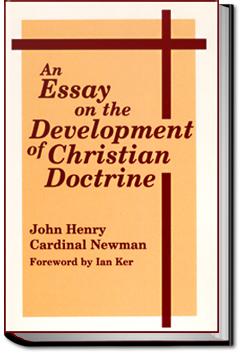UNLIMITED Audiobooks and eBooks
Over 40,000 books & works on all major devices
Get ALL YOU CAN for FREE for 30 days!
An Essay on the Development of Christian Doctrine
John Henry Newman
Book Overview:
After a long struggle against liberal tendencies in the Church of England and an unsuccessful attempt to establish the position of Anglicanism as a branch of historical Christianity whose doctrines could be proven to be identical with those of the primitive Church, John Henry Newman came to the painful realization that he could no longer remain a member of the Anglican Church. Increasingly drawn to Catholicism, he was nevertheless repulsed by the idea that the Roman Church, while preserving many ancient doctrines, had contaminated the faith by mixing into it its own invented traditions. Or could it be that these "new" doctrines were truly already present from the beginning, having only become more explicit and better understood with the passage of the centuries? "So, I determined to write an essay on Doctrinal Development; and then, if, at the end of it, my convictions in favour of the Roman Church were not weaker, to make up my mind to seek admission into her fold"
After a long struggle against liberal tendencies in the Church of England and an unsuccessful attempt to establish the position of Anglicanism as a branch of historical Christianity whose doctrines could be proven to be identical with those of the primitive Church, John Henry Newman came to the painful realization that he could no longer remain a member of the Anglican Church. Increasingly drawn to Catholicism, he was nevertheless repulsed by the idea that the Roman Church, while preserving many ancient doctrines, had contaminated the faith by mixing into it its own invented traditions. Or could it be that these "new" doctrines were truly already present from the beginning, having only become more explicit and better understood with the passage of the centuries? "So, I determined to write an essay on Doctrinal Development; and then, if, at the end of it, my convictions in favour of the Roman Church were not weaker, to make up my mind to seek admission into her fold"
How does All You Can Books work?
All You Can Books gives you UNLIMITED access to over 40,000 Audiobooks, eBooks, and Foreign Language courses. Download as many audiobooks, ebooks, language audio courses, and language e-workbooks as you want during the FREE trial and it's all yours to keep even if you cancel during the FREE trial. The service works on any major device including computers, smartphones, music players, e-readers, and tablets. You can try the service for FREE for 30 days then it's just $19.99 per month after that. So for the price everyone else charges for just 1 book, we offer you UNLIMITED audio books, e-books and language courses to download and enjoy as you please. No restrictions.
Try now for FREE!

"Love your service - thanks so much for what you do!"
- Customer Cathryn Mazer
"I did not realize that you would have so many audio books I would enjoy"
- Customer Sharon Morrison
"For all my fellow Audio Book & E-Book regulars:
This is about as close to nirvana as I have found!"
- Twitter post from @bobbyekat



Community Reviews
Newman answered for me a question with which I struggled for five years. Is the Bible alone enough to determine the content of our faith, without the comment of teachers and councils, past or present? This question is not Newman's main concern here, but the Essay nonetheless answered my question in
The only reason I don't give it 5 stars is that I feel so blasted stupid when I read Newman. What a mind.
This classic work argues that Christian belief, far from being a static list of propositions, develops gradually from the original seed of faith over time, until the fullness of the mystery opens into history like the blooming of a rose. When this book was written in the mid-19th century, evolution
This is a book I waited to read for a long time - not because I couldn't get to it. I was afraid of it. It is a great challenge of Evangelicalism's back-to-the-bible ethos. Newman asserts that doctrine develops through the agency of the Spirit-guided church, which, as he reminds us, is the pillar an
"To be deep in history is to cease to be a Protestant."
And the Blessed Cardinal would know. This is a deep work analyzing the development of doctrine over the centuries. Chapter V sets out the guidelines for recognizing true development of an institution rather than corruptions (this could also app
https://withmyowneyes.blog/2018/04/30...
As a Protestant, I objected that the Catholic Church taught doctrines contrary to, or absent from, Scripture. I was wrong. More than that, the objection backfires. Protestantism’s foundational doctrine, sola Scriptura, a bedrock of heresies since the sixteenth
I've been spending a lot of time going through this book over and over. I'm fascinated by Newman's writing style, by the tensions in his theory, and by the influence the theory has had on Roman Catholicism and other theories of doctrinal development. Newman's theory is of particular interest because
One of those books I have been meaning to get around to and all I can say is wow! I've read other works of his and so am not surprised by his towering intellect, but it is certainly shown here. There is good reason why various religions and branches of Christianity don't talk much about the developm